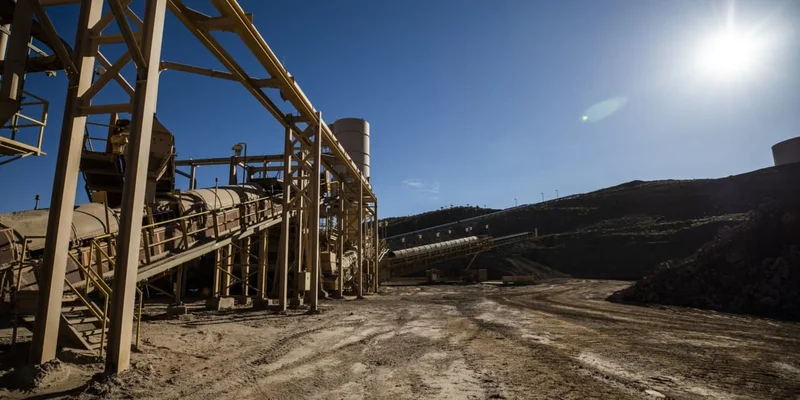So, let’s get this straight. The former president fires off a post on his own social media platform, and suddenly, the entire world of high-tech manufacturing is supposed to hold its breath.
I can just picture it. Some trader, bleary-eyed at 3 AM, sees the notification light up his phone. The all-caps rage-post from Donald Trump about China holding the world "captive" with its rare earth minerals. In that instant, before the coffee has even kicked in, algorithms start screaming and stock tickers for a handful of US mining companies start twitching upwards.
MP Materials up 8%. USA Rare Earth up 5%. A few angry sentences typed out on a smartphone just made a handful of people very, very rich. And for what? A threat? A “massive increase of Tariffs”? We’ve seen this movie before. We know how it ends.
This isn't strategy. It's rage-tweeting as foreign policy, a blast of digital buckshot meant to look tough while solving absolutely nothing.
The Pavlovian Stock Market
The market's reaction to this is so painfully predictable it’s almost sad. Trump rattles the saber, and the stocks for domestic alternatives jump. It’s the financial equivalent of Pavlov’s dog hearing a bell. The bell rings, the dog salivates. The post goes up, the traders buy. There’s no deep analysis here, just a knee-jerk reaction to a stimulus we’ve been conditioned to for years.
But what are these investors actually buying into? A vague threat to maybe cancel a meeting and slap on more tariffs? This is just lazy policy-making. No, 'lazy' isn't the right word—it’s a conscious abdication of responsibility. We’re talking about the 17 elements that basically run the modern world. They’re in our phones, our cars, and, most critically, in the guidance systems of the missiles the Pentagon likes to spend so much money on. China controls the processing and supply of most of them. This ain't a secret.

For decades, we happily offshored the dirty, complicated, and expensive work of mining and refining these metals. We got cheap electronics, and they got a strategic stranglehold on the global supply chain. And now we’re acting shocked that they’re using that leverage? Beijing isn’t even cutting off the supply; they’re just requiring a license. They’re putting a collar on the beast, reminding everyone who holds the leash. It’s a power move, and a smart one. So what’s our brilliant counter? A temper tantrum on Truth Social.
I went looking for a new coffee maker the other day. Just a simple machine. I spent an hour trying to find one, just one, that wasn't made in China. It's practically impossible. We're talking about a coffee maker, not a cruise missile. And we think a few tariffs are going to magically rebuild an entire industrial ecosystem that we dismantled over thirty years?
A Hole We Dug Ourselves
Here’s the part that really gets me. The Defense Department already made a deal with MP Materials back in July to try and shore up a domestic supply chain. That’s great. It’s also about twenty years too late and a fraction of what’s needed. Building out a complete mine-to-magnet supply chain in the US to compete with China’s state-subsidized behemoth is a monumental task. It requires decades of investment, navigating environmental regulations that we ourselves put in place, and developing expertise we’ve long since lost.
This whole song and dance, the threats, the market bumps... it's all so predictable that you have to wonder if anyone in charge is serious. Offcourse they're not. This isn’t about securing a supply chain for the next generation of American technology. It’s about generating a headline for tomorrow’s news cycle.
What does a real path to mineral independence even look like? Does it mean tearing up half of California to build new mines? Are we prepared for the environmental fallout we so eagerly outsourced to other countries? Or is the real plan just to make a lot of noise, watch a few domestic stocks get a temporary boost, and then quietly go back to buying whatever Beijing is willing to sell us? I think we all know the answer. This is a problem that was created by a thousand small, greedy, short-sighted decisions made over decades. It won’t be solved by one loud, angry post.
Then again, maybe I'm the crazy one here. Maybe this is just how superpowers conduct business in the 21st century.
Just Another Spin on the Hamster Wheel
Let’s be brutally honest. Nothing that happened on Friday changes the fundamental, ugly truth: we are completely, utterly dependent on a strategic rival for the materials that power our entire way of life. This latest flare-up is just another spin on the political hamster wheel. It creates the illusion of action, the drama of conflict, but the wheel itself never moves. We’ll be having this exact same conversation a year from now, and the year after that. The only thing that will have changed are the dates and the stock prices.
